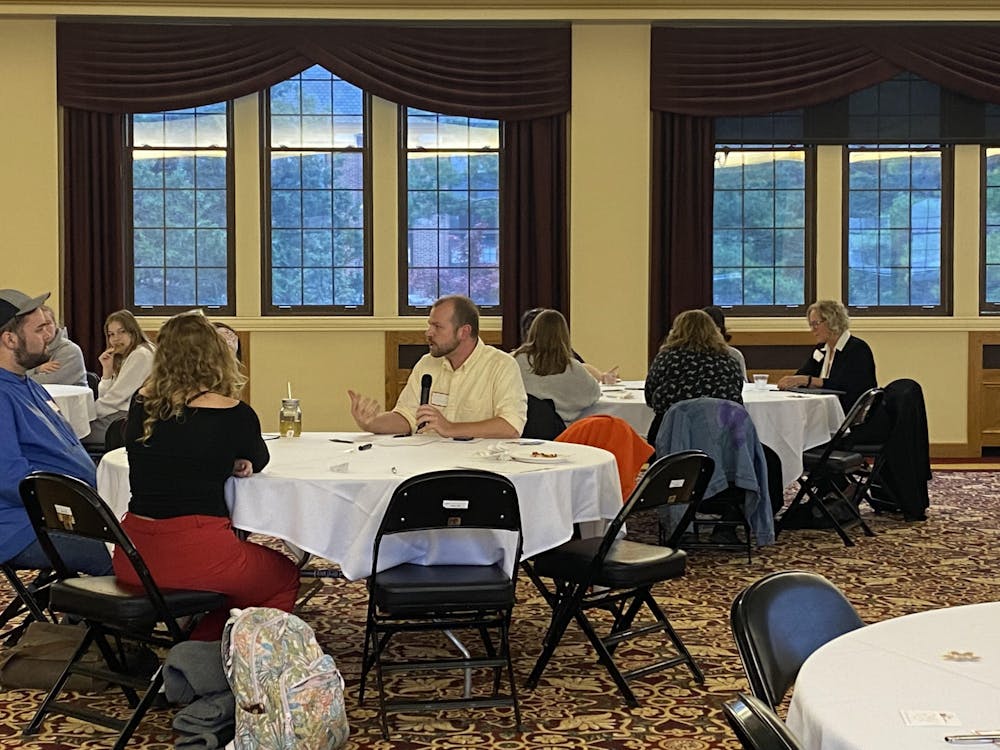Conversations that Matter: CMU students, faculty discuss politicizing education

Bryan Whitledge (center), an archivist for university digital records in the Clarke Historical Library, participates in a group discussion during a Conversations that Matter event, Sept. 28 in the Powers Ballroom.
Central Michigan University's Office of Institutional Diversity, Equity and Inclusion held their first segment of Conversations that Matter this year on Sept. 28 from 5 to 7 p.m. in the Powers Ballroom.
The event was open to students, faculty, community members and anyone else that wanted to join. Participants were fed dinner and discussed controversial topics by answering the question, “Has education become political?”
Georgina Wilson, a Counseling, Educational Leadership and Higher Education faculty member, facilitated the event and gave a brief presentation on how politics are involved in education in ways that are not noticeable at first. She spoke on the importance of having these hard conversations and noted that in order to better the community, these topics need to be talked about more.
“One of the biggest pieces that are missing around any critical conversation or topic that is plaguing our society right now is the lack of dialogue," Wilson said. "We have drawn a very thick line between each other and we have villainized the other, we have othered the other and we are viewing them in the most horrendous terms to where we don’t even think they deserve to engage in dialogue. This does not allow us to create a common solution to the point where dialogue is the only way out of this.”
Attendees were asked three questions to discuss with their table.
What has shaped your views over time about inclusivity as part of the educational experience? Think also about the stories of family, friends, and others you know? How do these experiences, along with your personal identity (age, race and ethnicity, gender, academic area or job, responsibility, religion, hometown, etc), shape your relationship to the issue?
Many participants said they came from small communities and were sheltered to the point where they had limited views on things like political standings and diversity.
“I actually remember how diverse my school was. Out of my class of 100 students there was one Black person,” Aspen Smith, a junior from Shepard studying secondary education, said.
Some students said being a part of the CMU community helped them experienced other cultures and see other points of view. They said this gave them the opportunity to branch out and decide what they believe in, instead of what they were told to believe while living in their small towns.
“My mom was in college when I was a kid and she was in school for engineering," Bryan Whitledge, an archivist for university digital records in the Clarke Historical Library, said.
"A lot of her professors were from the Middle East, so when I was little, if she brought me around college, I was around that diverse group of people. Since she was older, she could talk to her professors a lot better than her colleagues, and so I was taught to be curious at a young age.”
What do you find challenging about navigating this issue as a member of the CMU community? What are the barriers and opportunities for constructive discussion and policy concerning K-12 education in general and local communities like Mt. Pleasant specifically?
Many groups discussed that a common barrier in the community is conformity. Participants said many people are afraid to speak out and be different from what is considered the social norm, so they conform instead, which in turn does not solve any of the issues society is facing but creates hatred instead.
“Everything is so polarized – especially on social media – to where you either see one side or you see the other," Sara Gillette, a freshman studying environmental science, said.
"You are kind of forced to pick a side and go along with it," she said. "There is so much hatred towards the other side there is no constructive conversation happening.”
Attendees said this conformity eliminates outlets or ways to talk about pressing issues, which makes it increasingly harder for those who are trying to solve them.
“In a university we are so siloed, we spend so much time in our offices, doing our research, and doing our teaching we don’t always have the chance to get out there and meet new people of other professions or majors,” Jeff Fischer, faculty members in the Allen Foundation Culinary Nutrition Center, said.
“We don’t really have a lot of opportunities to talk about these issues, so I think the fact that there's no spaces where kids of our age can come together and discuss these issues – since we don’t have these types of things – no one really knows where we stand,” Grace Osiri a freshman studying data science, said.
What would you like to see happen, or what considerations do you think are important to take into account as our community, state, and nation continue the public discussion about publicly funded education? What would you like to add that we have not yet talked about?
Many groups discussed how there is so much change that needs to happen, but in order to do that, people need to be educated and aware of what is going on.
“I kind of think that we need to continue to raise the visibility and push for those changes," Jack Day, Human Development and Family Studies faculty member, said.
"It’s like a pendulum that swings back and forth between talking and not talking about these issues."
At the end of the event, participants were asked to fill out a survey indicating how valuable the experience was to them.






